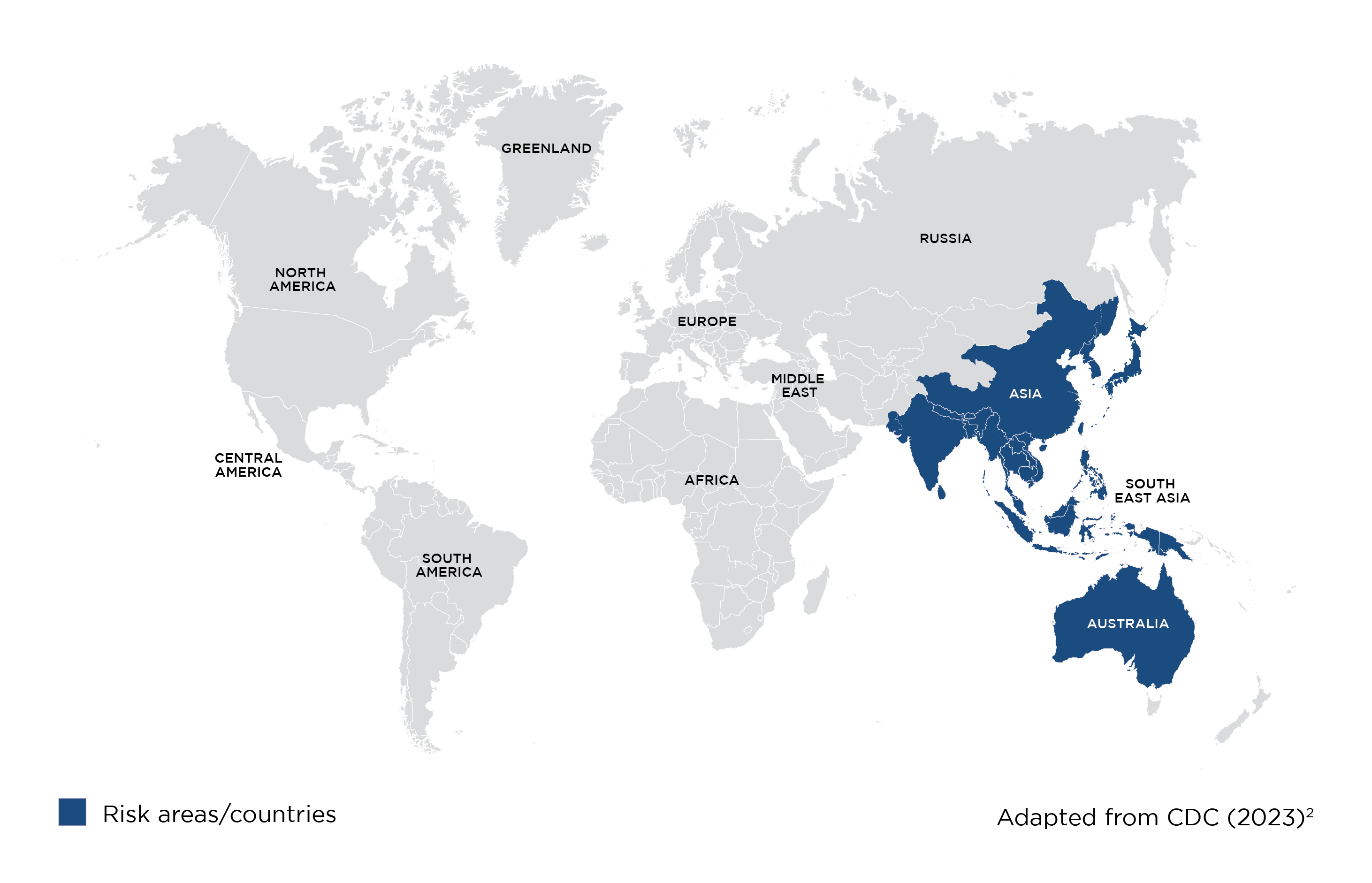Around a third of people who have severe Japanese encephalitis suffer from long-term complications.1
Disease video
Risk areas for Japanese Encephalitis

FAQs
-
Key fact
-
How do you get Japanese encephalitis?
When you’re bitten by mosquitoes carrying the virus.1
-
Which countries are affected by Japanese encephalitis?
Asian countries from India to Japan and Australia (see map). The risk is greater in rural areas.2
-
What are the symptoms of Japanese encephalitis?
Most people experience no symptoms as a result of their infection. Those that do experience sudden onset of high fever, chills, headache, muscle pain, mental confusion, spasms in the neck and spine, and muscle weakness.1
Symptoms usually occur between 4 and 14 days after being bitten, therefore you may start to feel ill when you are back home after your trip.1
-
How serious is Japanese encephalitis?
Most infections are asymptomatic. In rare cases (estimated 1 in 250), encephalitis develops when the virus spreads to the brain. This may cause fatal damage in 20-30% of severe cases.1
People who survive severe encephalitis can end up with a long-term disability.1
-
Can I prevent getting Japanese encephalitis?
You can take the following precautions to help reduce your risk of infection:
- Visit your nearest convenient pharmacy or specialist travel health clinic for a risk assessment before your trip
- Use a recommended insect repellent containing either Picaridin, DEET, PMD or OLE (oil of lemon eucalyptus), IR3535 or 2-undecanone3
- Wear appropriate clothing (e.g loose fitting long-sleeved clothes, long trousers, socks and shoes) to minimise exposed skin4,5
- Use insecticide-treated mosquito nets if you are sleeping or resting in accommodation that is not air-conditioned or sleeping outdoors during the day or night4
Ready to get started? Check now for your nearest travel health clinic.
Get friendly advice from the UK's largest network of travel clinics*.
* This list is not exhaustive and other travel health providers are available.
References
- World Health Organization. Weekly Epidemiological Record. Japanese Encephalitis Vaccines: WHO Position Paper – February 2015. Available online: https://www.who.int/wer/2015/wer9009.pdf?ua=1 (Last accessed May 2023)
- Centers for Disease Control and Prevention. Yellow Book 2024. Section 5 Travel-Associated Infections & Diseases. Japanese Encephalitis. May 2023. Available online: https://wwwnc.cdc.gov/travel/yellowbook/2024/infections-diseases/japanese-encephalitis (Last accessed May 2023)
- Centers for Disease Control and Prevention. Yellow Book 2024. Section 4 Environmental Hazards & Risks. Mosquitoes, Ticks & Other Arthropods. May 2023. Available online: https://wwwnc.cdc.gov/travel/yellowbook/2024/environmental-hazards-risks/mosquitoes-ticks-and-other-arthropods (Last accessed May 2023)
- Public Health England. Mosquito bite avoidance for travellers. January 2023. Available online: https://www.gov.uk/government/publications/mosquito-bite-avoidance-for-travellers (Last accessed May 2023)
- Fit for Travel. General Travel Health Advice. Mosquito Bite Avoidance. Available online: https://www.fitfortravel.nhs.uk/advice/malaria/mosquito-bite-avoidance (Last accessed May 2023)
UK-BOTB-2100024 (v2.0) May 2023
